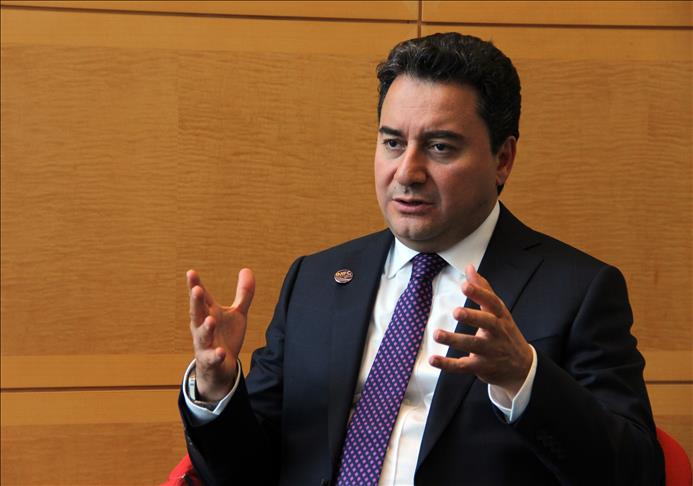
By Kasim Ileri
WASHINGTON
As Turkey gets ready to take the reins of the presidency of the G20, implementation of past commitments by the group’s members will guide its focus, Turkish Deputy Prime Minister Ali Babacan said Saturday.
Babacan spoke to The Anadolu Agency on the sidelines of the annual meeting of the International Monetary Fund and Monetary Committee.
The discussion centered on Turkey’s priorities for its term for the presidency, to be handed over by Australia by Dec. 1.
Implementation of commitments given
Turkey will assume the presidency in a very challenging global economic backdrop, Babacan noted, and one of its top priorities will be making good on previous promises.
"Commitments are expressed over and over, however, most of them go unfulfilled. Thus implementation of these commitments is going to be an important cross-cutting subject that Turkey would address," he said.
Babacan said that there are more than 900 commitments made by the G20 during Australia's presidency and this number is likely to increase. "Our priority will be to develop an effective monitoring mechanism for the implementation of these commitments in a structured, effective and timely manner," he said.
Global growth still not sustainable
The mastermind of Turkey’s economy touched on the global economic outlook and noted that besides fragile global growth, geopolitical developments pose risks to the global economic recovery.
"Despite the G20 members' decisive actions in the aftermath of the (global financial) crisis and very accommodative fiscal and monetary policies, global growth is still far from being strong or sustainable, or balanced," he said. "We also have to face the downside risks, including the geopolitical developments which are becoming more alarming recently."
In the face of these risks "growth strategies, financial regulation, employment plans and the reform of international institutions" would be particularly focused at the heart of G20 discussions, he noted.
Another priority will be to emphasize the link between growth and the investments on infrastructure so that Turkey can address the risks.
"We will be putting an effort to bring together the reforms that tangibly improve the investment climate, and to unlock private sector investments for both infrastructure and for small- and middle-sized enterprises (SME)."
Low income developing countries perspective
In addition to international tax issues and global financial regulation, another significant issue to be addressed is the challenges faced by low-income developing countries, Babacan said.
Small and medium sized enterprises in these countries will be a special focus for Turkey as most of the employment created within these enterprises are in developed and developing countries, according to Babcan.
"We also have already contacted the ICC (International Chamber of Commerce) to launch a global SME Forum," he said.
"ICC loved the idea and they have already started to work on this with more than 100 countries. They have a network and they are going to bring a global SME approach."
Turkey to grow by up to 4 percent
During the interview, Babacan also touched on the economic growth and challenges that the Turkish government have struggled against.
The International Monetary Fund expects Turkey to record 3 percent growth in 2014 and 2015 while Turkey foresees a growth rate of 3.3 percent this year and 4 percent in 2015. Babacan explained the difference in projection by saying that if Turkey does not really take any measure and simply watches global economic developments, then the growth rate would remain at the 3 percent as the IMF foresees.
He said, however, "Our expectation of 4 percent growth would be reached through additional efforts including structural reforms and productivity growth."
Turkey’s government has been working on 25 additional structural reforms that will address a wide spectrum of issues, he said.
The country was able to significantly reduce its current deficit and lower it to under 6 percent after being above 7 percent last year.
Babacan also added that in the past 12 months, Turkey has provided jobs for about 200,000 people, which came as a result of the private sector's confidence in the economy.
Anadolu Agency website contains only a portion of the news stories offered to subscribers in the AA News Broadcasting System (HAS), and in summarized form. Please contact us for subscription options.

